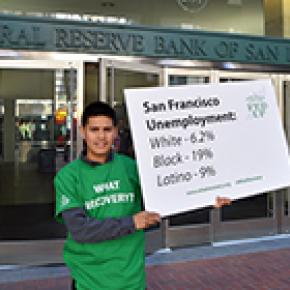Pressures mount on Wells Fargo following fake-accounts scandal

Pressures mount on Wells Fargo following fake-accounts scandal
Pressure mounted on Wells Fargo & Co. Friday following its fake-accounts scandal, as the bank faced new calls to...
Pressure mounted on Wells Fargo & Co. Friday following its fake-accounts scandal, as the bank faced new calls to allow affected customers to file lawsuits and for the board of directors to rescind the pay of a key senior executive.
The demands came just one day after Chief Executive John Stumpf resigned from a Federal Reserve advisory panel.
Senators had pushed for Stumpf not to be reappointed, saying it was inappropriate for someone who presided over improper sales tactics to be giving advice to an agency involved with bank regulation.
Stumpf has been under intense fire since the bank this month agreed to pay $185 million to settle investigations by Los Angeles City Atty. Mike Feuer, the Consumer Financial Protection Bureau and the Office of the Comptroller of the Currency into an aggressive sales culture that led bank employees to open as many as 2 million accounts that customers didn’t authorize.
The Justice Department is investigating possible criminal charges, and some senators have called for a Labor Department investigation into whether the bank failed to pay employees overtime when they worked late nights and weekend to meet sales quotas.
A group of Senate Democrats continued to attack Wells Fargo on Friday, publicly calling on Stumpf to stop enforcing mandatory arbitration clauses in the agreements for customer accounts that were not authorized.
Sen. Sherrod Brown (D-Ohio) had pressed Stumpf on the matter at a Senate Banking, Housing and Urban Affairs Committee hearing Tuesday, arguing that it was unfair not to allow those customers the ability to file lawsuits against the bank.
Stumpf said at the time that he would have to “talk to my legal team.”
Brown said Friday that he and his colleagues want relief for bank customers and more answers from Wells Fargo.
“If Wells Fargo really does want to look out for the customers, if they really are in fact sorry, as the CEO said, for these unauthorized accounts, they ought to let the court system work if these people who were wronged want to bring suit,” he said.
Wells Fargo's collateral damage: customers' credit scores
Wells Fargo's collateral damage: customers' credit scores
The Democrats sent a letter to Stumpf on Friday, requesting more information about the arbitration clauses, including how many customer complaints about fake accounts were forced into arbitration proceedings.
Brown was among those writing to Stumpf, along with Patrick Leahy of Vermont, Richard Durbin of Illinois, Richard Blumenthal of Connecticut, Al Franken of Minnesota and Elizabeth Warren of Massachusetts.
A spokeswoman for Wells Fargo did not immediately respond to a request for comment.
Also on Friday, an activist investment group that is part of the Change to Win union federation wrote to Wells Fargo’s board, asking it to rescind at least part of the compensation earned by the executive who oversaw the employees who opened unauthorized customer accounts.
The letter from CtW Investment Group, which is a Wells Fargo shareholder, adds to the pressure on the bank to claw back some of the approximately $100 million earned by Carrie Tolstedt, the company’s former head of community banking.
Wells Fargo’s stock has declined by about 8% since the settlement was announced on Sept. 8.
On Thursday, five senators called for Stumpf not to be reappointed to the Federal Advisory Council, a 12-member body that meets four times a year with the Fed’s Board of Governors to discuss banking and economic matters.
Stumpf had represented the Fed’s San Francisco district, where Wells Fargo is based, since 2015.
He “made a personal decision to resign” and notified the Fed on Thursday, Wells Fargo spokeswoman Jennifer Dunn said.
“His top priority is leading Wells Fargo,” she said.
Sen. Angus King, an independent from Maine, organized the letter to the head of the board of directors of the Federal Reserve Bank of San Francisco asking that Stump not be reappointed to the advisory council when his term expires on Dec. 31.
“It would be ironic if the Federal Reserve, a key federal banking regulator tasked in part with ensuring the fair and equitable treatment of consumers in financial transactions, continued to receive special insights and recommendations from senior management of a financial institution that just paid a record-breaking fine to the Consumer Financial Protection Bureau for ‘unfair’ and ‘abusive’ practices that placed consumers at financial risk,” they wrote.
The letter also was signed by Warren and Democratic Sens. Maria Cantwell of Washington and Jeff Merkley and Ron Wyden, both of Oregon.
Their call was backed by Fed Up, a coalition of labor, community and liberal activist groups that has pushed to reduce the influence of bankers on Federal Reserve policies.
“Commercial banks already have too much influence within the Federal Reserve System,” the coalition said Thursday. The coalition also asked its members to sign a petition calling for Stump’s “immediate dismissal” from the advisory panel.
“Stumpf, as the CEO of a bank accused of ‘unfair’ and ‘abusive’ practices, should have no role advising the Federal Reserve’s Board of Governors on policies affecting working families,” Fed Up said.
By Jim Puzzanghera
Source
Warren allies demand answers from Clinton on Wall St. ties
“On behalf of our nine million supporters across the country, we are writing to request more information about your...
“On behalf of our nine million supporters across the country, we are writing to request more information about your positions regarding the revolving door between Wall Street and the federal government,” reads a statement backed by Democracy For America, Rootstrikers, CREDO Action, MoveOn.Org Political Action, the Center for Popular Democracy Action, The Other 98%, Friends of the Earth Action, and American Family Voices.
The missive, which comes as Clinton interrupts her Hamptons vacation to unveil her rural policy platform in Iowa on Wednesday, specifically notes that Clinton has yet to support or comment on Sen. Tammy Baldwin’s Financial Services Conflict of Interest Act. Progressive icon Sen. Elizabeth Warren — who has ties to many of those who signed the letter — has encouraged all presidential candidates to back the legislation, as both Bernie Sanders and Martin O’Malley have done.
“These types of ‘golden parachute’ compensation packages are highly controversial, and for good reason,” the letter reads. “At worst, it results in undue and inappropriate corporate influence at the highest levels of government — in essence, a barely legal, backdoor form of bribery.”
The letter concludes by posing two questions to the Democratic front-runner: “Do you still support the use of this controversial compensation practice?” and “If you become president, will you allow officials who enter your administration to receive this sort of bonus?”
While Clinton has made steps to appeal to the types of progressive voters behind this letter, she has so far resisted pressure from the left to support reviving the Glass-Steagall Act, which separated commercial and investment banking before it was repealed in 1999. And members of these groups who wanted bank antagonist Warren to run for the presidency are on high alert this week after news broke that the Massachusetts senator met with Vice President Joe Biden over the weekend as he considers his own presidential ambitions.
“It’s hard to imagine Democrats’ 2016 nominee will be truly tough on Wall Street banks that break the law, if they won’t commit to banning their advisers from receiving legalized bribes from those same banks,” said Charles Chamberlain, executive director of Democracy for America, a group founded by former Vermont governor and current Clinton backer Howard Dean.
The letter names a pair of Clinton associates who moved from banks to the State Department: Robert Hormats, an undersecretary who came from Goldman Sachs, and Thomas Nides, a deputy secretary who came from Morgan Stanley.
Warren has suggested repeatedly that any candidate seeking her endorsement must agree not to appoint officials with Wall Street ties.
“Anyone who wants to be president should appoint only people who have already demonstrated they are independent, who have already demonstrated that they can hold giant banks accountable, who have already demonstrated that they embrace the kind of ambitious economic policies that we need to rebuild opportunity and a strong middle class in this country,” she said in July.
Source: Politico
Report: Black Unemployment in Bay Area More Than Three Times the Average
SF Examiner - March 6, 2014, by Chris Roberts - After 200 unanswered job applications, Ebony Eisler finally landed a $...
SF Examiner - March 6, 2014, by Chris Roberts - After 200 unanswered job applications, Ebony Eisler finally landed a $15 an hour position as a medical assistant in Mission Bay. But since she's a temp worker, she earns less than her co-workers, who make $20 to $25 per hour for the same work.
Still, as a black woman in San Francisco, she is fortunate. The unemployment rate for black people in the Bay Area is 19 percent, according to 2013 U.S. Census Bureau data crunched by the Economic Policy Institute.
Blacks are unemployed at more than three times the rate of workers of other races, according to this data. The Bay Area finished 2013 with a 6 percent total unemployment rate, according to the Bureau of Labor Statistics.
In San Francisco, unemployment has dropped rapidly since Mayor Ed Lee took office in January 2011, when the jobless rate was 9.5 percent. The most recent figures from the state Employment Development Department — which does not publish jobless rates by race — pegged The City's unemployment rate at 3.8 percent, by far the rosiest employment figures since the first dot-com boom at the turn of the millennium.
The wide gulf in the jobless rate between ethnic groups living in the same city belies the idea that The City and state have fully recovered from the Great Recession, according to advocates with the leftist Center for Popular Democracy.
The group released the unemployment figures by ethnicity Thursday as part of a national campaign to convince the Federal Reserve Bank to keep interest rates low in order for the economic recovery to trickle down to all workers.
So far, "the recovery is based on white America alone," said Eisler, 36, a Bayview resident who holds an associates degree and a certified nursing assistant license. Her current job, the best she could find, does not cover her $1,800 a month rent, she said.
Statewide, the jobless rate for black people is 14 percent, according to the Economic Policy Institute, compared to 6.1 percent for whites, 8.5 percent for Latinos and 5.9 percent for Asians.
Source
Immigrants need sanctuary — and lawyers
Ali, a green card holder and father of three young daughters in Baltimore, was driving his friend home when they were...
Ali, a green card holder and father of three young daughters in Baltimore, was driving his friend home when they were pulled over by police in a routine traffic stop. Ali's friend, who was undocumented, had a baggie of marijuana in his possession, and Ali, wanting to save his friend, took the blame. Ali believed his own immigration status would protect him even if convicted of possession. But a year later, he was threatened with deportation. He was arrested and, lacking a lawyer, detained for months, keeping him away from his family. Without a breadwinner, his wife, who was undocumented and unable to work, and children were evicted from their home.
Read the full article here.
Letter: Congress must pass law for universal health care
Here are the health care issues on which we need government to act......
Here are the health care issues on which we need government to act...
Read the full article here.
The Fed’s Main Job Is Jobs, And A Coalition Plans To Keep It On Task
Campaign for America's Future - September 4, 2014, by Isaiah Poole - A lot of eyes will be on the Federal Reserve...
Campaign for America's Future - September 4, 2014, by Isaiah Poole - A lot of eyes will be on the Federal Reserve Friday when the Labor Department releases its August unemployment statistics. But where will the Fed’s eyes be focused? A group of activists are planning the next steps of their effort to keep the Fed focused on the continuing unemployment crisis, and keep the Fed from taking actions that will make things worse for millions still seeking work.
“We’ve got a lot of work ahead of us,” said Shawn Sebastian of the Center for Popular Democracy, who was part of a group of activists and unemployed people who confronted members of the Fed at last month’s economic summit in Jackson Hole, Wyo. That includes following up on a promise by Fed chair Janet Yellen to meet with the group in Washington and pressing a more detailed plan for how the Fed should proceed to help the Main Street economy grow.
“We are going to be looking at the full range of policy options,” Sebastian said.
The “inflation hawks” were poised to seize the narrative when the members of the Fed attended the Jackson Hole summit. These Fed members, egged on by conservative academics and policymakers, want the Fed to put the brakes on economic growth and turn its attention to fighting inflation, even though there are no signs that inflation is an imminent threat. On the contrary, wages as a percentage of economic output are at their lowest level since the late 1940s (while corporate profits as a share of the economy are at record highs), one sign that there are far more people looking for work than there are jobs for them.
What the hawks did not count on was the Center for Popular Democracy’s ragtag group of 10 unemployed people and activist supporters. They trekked to Jackson Hole to confront Fed members with their stories of struggling to find decent jobs, along with a demand that the Fed not abandon its unfinished role in rebuilding the middle-class economy, in the form of a letter endorsed by more than 70 organizations. Their biggest success, Sebastian said, was a two-hour meeting with Kansas City Federal Reserve Bank President Esther George, who just before Jackson Hole said in an interview with CNBC that it was time for the Fed to begin thinking about raising interest rates “when you see the economy getting as close as we are to full employment.”
But Sebastian and his group told George that the economy was nowhere near full employment and that the analysis of the inflation hawks was “lacking in relevance, substance and rigor.” One member of the group told of how she went from being an MBA who had risen to a management job over 15 years to being laid off and unable to find work for months, finally settling for a job that paid half as much as the job she lost.
It’s not clear what substantive effect hearing these stories had on George and other inflation hawks on the Fed, Sebastian said. “But I do hope we contributed to her thinking and we also started an engagement” with the Fed, he said. Fed members now know that when they discuss economic policy, “you can’t make decisions without public scrutiny anymore, because we’re paying attention now.”
One of the ideas that the group will refine and attempt to build consensus around would have the Fed invest directly in infrastructure bonds and similar government instruments, in much the same way that it purchased billions in bonds to prop up the financial sector in the years following the 2008 financial crash. The bond-purchasing program, known as quantitative easing, helped boost Wall Street share prices, according to most experts, but had no direct effect on job-creation or on bringing the economic recovery to communities around the country hardest hit by the crash – as the nation has now vividly seen in Ferguson, Mo.
Having the Fed directly buy bonds that would enable federal, state or local governments to fund transportation projects, school construction or other public facilities would put the Fed’s power to work in ways that directly creates jobs in the short run and assets that enhance the nation’s competitiveness and well-being in the long run.
The Fed could also better use its regulatory authority to prod the banks to pour into the economy the close to $2 trillion that is now sitting in its vaults. That hoarded cash could be put to work creating jobs and lifting the wages of working-class people.
Whatever policies take shape during the next phase of the Center for Popular Democracy’s campaign to keep the Fed focused on full employment, Sebastian says that the opening round has been a success in sending the message that “we’re not in an inflation crisis … we are in an unemployment crisis. You can’t ignore an ongoing crisis for the sake of a ghost of inflation that may or may not appear.”
Black Lives Matter coalition issues first political agenda demanding slavery reparations

Black Lives Matter coalition issues first political agenda demanding slavery reparations
A coalition built on the Black Lives Matter movement has issued its first political agenda demanding reforms in the...
A coalition built on the Black Lives Matter movement has issued its first political agenda demanding reforms in the American justice system and reparations for slavery. Some 60 organisations in the Movement for Black Lives endorsed the platform calling for "black liberation" that had been forged over a year of discussions.
The agenda included six demands and 40 policy recommendations, including a reduction in military spending and a focus on protecting safe drinking water.
It also called for an end to the death penalty, decriminalisation of drug-related offences and prostitution, and the "demilitarisation" of police departments. It seeks reparations for lasting harms caused to African-Americans by slavery and investment in education, jobs and mental health programmes.
The agenda by the Movement for Black Lives came hard on the heel of the Republican and Democratic national conventions, which failed to satisfy members.
"On both sides of the aisle, the candidates have really failed to address the demands and the concerns of our people," said Marbre Stahly-Butts of the Movement for Black Lives Policy Table, which crafted the agenda.
He told the New York Times. "So this was less about this specific political moment and this election, and more about how do we actually start to plant and cultivate the seeds of transformation of this country that go beyond individual candidates."
The overarching mission of the group is to halt the "increasingly visible violence against black communities". Its agenda was issued just days before the second anniversary of the killing of unarmed black teen Michael Brown by a white police officer in Ferguson, Missouri.
Brown's death and the killing of other unarmed black men by white officers was the birth of the Black Lives Matter movement.
"We seek radical transformation, not reactionary reform," said Michaela Brown, a spokeswoman for Baltimore Bloc, one of the organisations that worked on the platform.
"As the 2016 election continues, this platform provides us with a way to intervene with an agenda that resists state and corporate power, an opportunity to implement policies that truly value the safety and humanity of black lives, and an overall means to hold elected leaders accountable."
By MARY PAPENFUSS
Source
Debbie Lesko wins Arizona congressional race, leaves Republicans anxious about the fall

Debbie Lesko wins Arizona congressional race, leaves Republicans anxious about the fall
Ady Barkan, the California man with ALS who confronted Sen. Jeff Flake, R-Arizona, over health care issues last year,...
Ady Barkan, the California man with ALS who confronted Sen. Jeff Flake, R-Arizona, over health care issues last year, started an organization to oppose GOP health care policies and raised money for Tipirneni. "There is no such a thing as a safe Republican seat this year. Dr. Hiral Tipirneni overcame the odds to come within striking distance of victory in a deep red district, because the Republicans put their donors' greed ahead of the health of families like mine," Barkan said Tuesday.
Read the full article here.
Simplify Investments to Keep Them Clean
New York Times - May 11, 2014, Room for Debate: Connie Razza - Public pensions are under threat from outright fraud as...
New York Times - May 11, 2014, Room for Debate: Connie Razza - Public pensions are under threat from outright fraud as well as the financial sector’s drive to generate higher profits for itself, regardless of the cost to our communities. The public can take simple steps to eliminate this danger. Investments should be put in index funds, which typically outperform actively managed portfolios. A recent comprehensive study of the performance of state pension funds found that the 46 state funds studied could save $6 billion in fees annually, while achieving returns as good or better than their actively managed portfolios. Most privately managed pensions already pursue indexing strategies, through vehicles like Amalgamated Bank’s LongView Funds, and successfully secure strong retirement savings for participants. Public pension funds should index a significant portion of their funds under management to save billions while still generating first-rate returns.
Index funds outperform managed portfolios. Relying on them would save on fees and avoid underhanded behavior.
These funds would also save significant amounts in management fees by hiring talented in-house investment managers for significant portions of actively managed pension assets.
Any investment should be presented in plain language in a standardized, easy-to-read template, so trustees and pension participants know exactly what the product does, how it makes money and what its fees and risks are. Like cell phone agreements, all fees should be disclosed up front. Like credit card bills, actual returns and long-term, historical performance should be clearly presented. Oversight of fiduciaries should be bolstered and any who violate their responsibility to retirement funds should be pursued legally. When the State Employees Association of North Carolina hired a pension forensic investigator, they found that the state treasurer Janet Cowell had invested $30 billion in illegal, high-risk funds, causing $6.8 billion in losses. A more robust standing oversight body could have prevented much of that improper investment. The state should aggressively prosecute both pension trustees and private investment managers who put their own benefit above the interest of pension participants. More eyes on the management of retirement assets would help ensure responsible investment strategies and management. Creating a publicly managed pool of retirement funds would invest more residents in pension management, while ensuring that fewer workers would find themselves insecure in retirement. And, increased pension funds make possible more diverse, responsible investments for the actively managed portions of the funds. For instance, funds can take a decisive role in infrastructure investments that will both improve their communities and provide steady, long-term returns.
Source
Woman who confronted Flake 'relieved' he called for delaying Kavanaugh vote

Woman who confronted Flake 'relieved' he called for delaying Kavanaugh vote
Maria Gallagher, who on Friday confronted Sen. Jeff Flake with her story of sexual assault, said she was "relieved"...
Maria Gallagher, who on Friday confronted Sen. Jeff Flake with her story of sexual assault, said she was "relieved" when the Arizona Republican called for an FBI investigation into allegations against Supreme Court nominee Brett Kavanaugh.
Gallagher, a resident of New York, stood next to Ana Maria Archila, co-executive director of the Center for Popular Democracy, earlier Friday as the two held open the doors of an elevator Flake was taking on his way to the Senate Judiciary Committee. Soon after, Flake said he would vote to advance Kavanaugh's nomination to the Senate floor, but he said he wanted a vote in the full body delayed for one week while the FBI investigated the allegations.
Read the full article here.











2 months ago
2 months ago